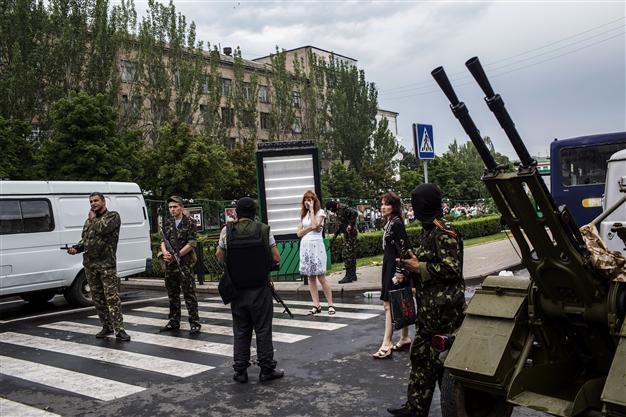Ukraine leader vows to punish rebels after downing of chopper
KIEV - Agence France-Presse

Pro-Russian fighters stand in a street, outside the Donbas building in central Donetsk, May 29. AFP Photo
Ukraine's president-elect Petro Poroshenko vowed to punish pro-Russian rebels who downed an army helicopter in the east of the country, killing 12 troops in one of the deadliest attacks of the insurgency.The militants shot the Mi-8 helicopter gunship out of the sky with a sophisticated surface-to-air missile May 29, prompting the White House to say the incident raised concerns about the rebels being supplied "from the outside."
"We have to do everything we can to ensure no more Ukrainians die at the hands of terrorists and bandits. These criminal acts by the enemies of the Ukrainian people will not go unpunished," said Poroshenko, according to Ukrainian news agencies.
Defence Minister Mykhailo Koval was to give details on the attack near the industrial town of Slavyansk at a press briefing early May 30.
One of the separatists' leaders made a surprise admission May 29 that 33 out of more than 40 rebels killed during a raid on Donetsk airport this week were Russian nationals from Muslim regions such as Chechnya.
The revelation challenged President Vladimir Putin's rejection of Russian links to the separatist drive and supports Kiev's claims that the rebels do not represent the true will of the miners and steel workers who have turned the east into the economic engine of Ukraine.
U.S. Secretary of State John Kerry said late May 29 there was "evidence of Russians crossing over, trained personnel from Chechnya trained in Russia, who've come across to stir things up, to engage in fighting."
Kerry urged Russia to take advantage of Sunday's presidential election and "build a road forward where Ukraine becomes a bridge between the West and the East."
Russian troops massed on Ukraine's borders are also moving back toward Moscow, but there are still "danger signs," he told PBS television.
Moscow urges 'immediate ceasefire'
Moscow meanwhile called on Kiev to impose an immediate ceasefire and urged the West to use its influence to prevent "a national disaster" in Ukraine.
"The international community awaits from Kiev an immediate ceasing of military activities in the east of the country and the withdrawal of troops. Without that, achieving peace in Ukraine is impossible," the foreign ministry said in a statement.
Western-backed Poroshenko - winner of 54.7 percent of Sunday's vote and due to be inaugurated on June 7 - needs to avert another showdown with Russia that could see his economically teetering nation cut off from gas supplies by the start of next week.
But cash-strapped Ukraine appeared to avert the immediate threat of a gas cut-off when the European Union announced that a new round of talks between the EU, Russia and Ukraine will be held in Berlin on May 30.
EU Energy Commissioner Guenther Oettinger, who will attend the meeting, said earlier this week Russia and Ukraine had a "good chance" of striking a deal by June 1.
Yet the Kiev government's attention Thursday was fixed on Slavyansk - an industrial city of 120,000 mostly ethnic Russians that was the first of a dozen towns and cities seized by the rebels in response to the February ouster in Kiev of a pro-Kremlin president.
"I just received information that near Slavyansk, the terrorists - using a Russian man-portable air defence system - shot down our helicopter," acting President Oleksandr Turchynov told parliament.
Those killed included General Volodymyr Kulchytskiy, six members of the National Guard force made up of volunteers and interior ministry troops.
It was the highest death toll since Ukraine lost 18 soldiers during hours of heavy fighting in the same Donetsk region on May 22.
White House spokesman Jay Carney said while still trying to verify the reports, "we are concerned that this indicates separatists continue to have access to advanced weaponry and other assistance from the outside."
OSCE monitors accused of spying
A separatist spokesman had earlier told Russian news agencies that the helicopter was downed in a fierce battle that was still raging on the southern outskirts of Slavyansk.
The city's self-proclaimed "people's mayor" announced that four civilian monitors from the Organization for Security and Cooperation in Europe (OSCE) had been detained on suspicion that they were spies.
"No one arrested them. We detained them. Now we will work out who they are, where they were going and why, and we will let them go," Vyacheslav Ponomaryov told Russia's Interfax news agency.
He later told Russia's RIA Novosti agency that they were being held in the town of Makiivka on the eastern outskirts of Donetsk.
But the pro-Russian "prime minister" of the self-declared Republic of Donetsk added confusion over their fate, raising uncertainty about their whereabouts.
"We do not know where they are and we are looking for them," said Alexander Borodai, adding that the Slavyansk mayor had a tendency "to exaggerate things."
A source at the OSCE told AFP that the missing team - a Dane, an Estonian, a Swiss national and a Turkish citizen - included one woman and that negotiations for their release had been going on for some time.
With the Berlin talks set for Friday Kiev has been relieved from a deadline to pay Russia $2 billion under in EU-brokered agreement or face a halt in gas supplies next week that would also hit parts of Europe.
Russia and Ukraine launched their third gas war in less than a decade after Moscow decided to cancel its previous rebates and nearly double the price it charges Kiev for gas after Kremlin-backed president Viktor Yanukovych's fall in February.
About 15 percent of all gas consumed in Europe is pumped in from Russia through Ukraine and analysts say it is in both sides' interest to find a compromise.
















